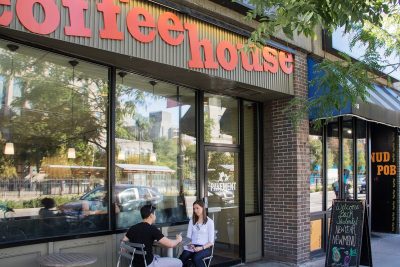The COVID-19 pandemic poses health risks for many individuals, but no amount of handwashing can protect businesses from the economic challenges it brings.

Boston University’s non-essential small businesses were forced to close with Gov. Charlie Baker’s mandate starting March 24. Until at May 4, the quietness of Commonwealth Avenue poses more grave consequences for employees and store owners than a shortage of lattes for coffee lovers in the city.
Andrew LoPilato, director of operations of Pavement Coffeehouse, said he first started to see a significant drop in business on the weekend of March 13, before Pavement stores closed indefinitely on March 19. Leading up to the closure, he said the drop in business was particularly prominent at the BU location, where they went from hundreds of customers a day to a few dozen.
“The impact to the business is very, very severe. There’s no understating it,” LoPilato said. “Most stores, on a case by case basis, we’re going to be considering this going forward … if it’s feasible to stay open.”
LoPilato said the community has been understanding of the need to prioritize public health during these times, but he said how long it will take to return to normal is still unknown.
“There’s a lot of uncertainty right now for how long [the pandemic] will last and what is a new normal,” LoPilato said. “I hope that we’re all happy and healthy, and in three weeks that we can resume business.”
Juan Ortner, an assistant professor in the Department of Economics at BU, wrote in an email that it is “too soon” to gauge the overall economic impact of the coronavirus pandemic, but it’s impact is already profound.
“The short answer is that the economic consequences will be bad,” Ortner wrote. “Now, the key question is, how bad?”
While some economists suggest the current pandemic could lead to a financial situation like the Great Recession in 2008 to 2009, Ortner wrote that government action, as well as how long social distancing lasts, will play a great role in determining the severity and ability for businesses to bounce back.
“Some businesses can adapt to these circumstances relatively better than others,” Ortner wrote. “Small businesses and brick and mortar stores are among the ones most affected by this situation.”
Jessica Pruitt, an associate marketing manager at Buffalo Exchange, a thrift store offering affordable, sustainable new and recycled items at 51 locations across the country, said deciding to close all stores — including the Allston location — on March 16 wasn’t easy, but ultimately necessary.
“That was a tough decision to come to,” Pruitt said. “But as the coronavirus outbreak continued to spread, it became clear that we needed to respond in a way that really best protected our employees and the communities that we’re a part of.”
However, Pruitt said the Sell by Mail program — in which people can pack and ship their clothes in a prepaid UPS shipping bag and receive payment or trade for other items — is still up and running. Maintaining this program keeps some people employed, Pruitt said, and garners more exciting inventory when the stores reopen.
“If you’re stuck at home or staying inside more, it’s a great chance to do some cleaning,” Pruitt said. “Cleaning’s a great way to de-stress and you can do your closet clean-out [and] send it to us. That way when we reopen, we’ll have lots of great inventory to sell to people.”
When thinking about reopening, Pruitt said one of her concerns is that the stigma around thrift stores will prevent people from supporting their business. However, she said Buffalo Exchange prides itself on being a sustainable brand and thoroughly evaluates everything it sells.
“There’s always the idea, the stigma that secondhand clothing is maybe not as clean and things like that, so I think that’s maybe a bit of a challenge,” Pruitt said. “But obviously we are always evaluating clothing and making sure that when we’re buying it in, it’s clean and ready to go out on the racks.”
Returning to business as usual will likely be a “slow process,” but Pruitt said Buffalo Exchange is optimistic about returning.
“We’re really excited to see our customers in the stores again,” Pruitt said, “and really can’t wait to welcome them back.”
LoPilato said he wants to emphasize that people stay safe during this time. However, he said customers can support Pavement by purchasing coffee online from their roastery where they are taking “all sanitary precautions” to make sure everything is safe. Pavement is offering free shipping for all U.S. orders to promote this initiative.
“In quarantine everyone is spending a lot more time home,” LoPilato said. “[People] can still drink our coffee, they could still get our coffee shipped to them at home.”
Pruitt and LoPilato both said buying gift cards online is another great way to continue to support their businesses at this time.
“That’s a way for [small businesses] to have money still running through the doors right now,” Pruitt said. “And then they can spend that money when the stores reopen.”
The simplest thing consumers can do to help businesses return back to normal as fast as possible, Ortner wrote, is to simply stay home.
“Regarding what we can do to mitigate the situation,” Ortner wrote, “the best each of us can do is respect social distancing and do our part to limit the spread of the virus.”

































































































































